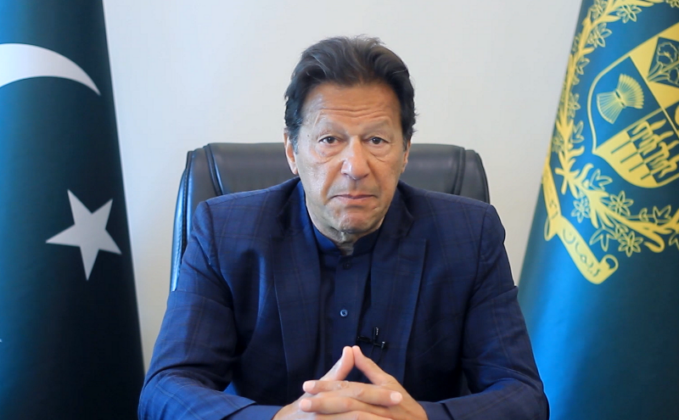GWADAR: Prime Minister (PM) Imran Khan on Monday said that the future belongs to Gwadar emerging as the focal point of development and ensuring prosperity for the entire country.
The prime minister, who arrived in Gwadar on a day-long visit inaugurated the first phase of Gwadar Free Zone besides performing the groundbreaking of the its second phase spread at 2,200 acres. He also
The premier also witnessed the signing of two MoUs with China for carrying out development projects including the implementation agreement on setting up of 1.2 MGD desalination plant to resolve the shortage of drinking water for the residents of Gwadar.
Other agreements included China’s grant for solar generators for South Balochistan, and the groundbreaking of North Gwadar Free Zone and Enterprises.
Addressing the launch of development projects here in the port city, the prime minister said Gwadar would open up new avenues of opportunities for regional trade.
Chairman Senate Sadiq Sanjrani, Foreign Minister Shah Mahmood Qureshi, Information Minister Chaudhry Fawad Hussain, Minister for Defence Production Zubaida Jalal, Minister for Maritime Affairs Ali Zaidi were also present on the occasion.
The prime minister said his vision of an emerging Pakistan was a steadfast nation which was committed to the prosperity of the country.
Balochistan Chief Minister, Jam Kamal Khan, said the provincial government had been collaborating with the CPEC Authority to resolve the issues of customs. He drew attention to the problem regarding the relocation of locals along the Eastbay and mentioned that efforts were underway for an amicable solution.
He said the Public Sector Development Programme (PDSP) for the current fiscal year (FY22) covered the entire Balochistan province, adding that the extension of Gwadar Hospital up to 200 beds, construction of the first university in Gwadar, border markets and uplift of villages were on the cards.
Speaking on the occasion, Chinese Ambassador Non Rong said that over the past eight years, Pakistan and China had accelerated their pace on several projects related to civic amenities, particularly clean water and solar plants.
He said Gwadar was a showcase of the “Chinese solution” for Pakistan’s development.
“By taking a comprehensive way of development, Gwadar Port would turn into a business hub,” he said, adding that China would continue to extend support for a shared future with Pakistan.
CPEC Authority Chairman Lt Gen (r) Asim Saleem Bajwa said the Gwadar Free Zone spread at 60 acres had been completed where 46 enterprises were operational.
“The groundbreaking of the second phase at the vast 2,200 acres starting today would usher in a new era of prosperity in Gwadar and in Balochsitan,” he added.
He mentioned that the personal interest of Prime Minister Imran Khan had resulted in materialisation of transshipment policy, Afghan transit policy, the framework signing and execution of border trade with Iran and starting work at Eastbay Expressway.
He said several significant development projects were in progress including the Gwadar International Airport and Vocational Institute to develop skills of the locals.
Bajwa said conspiracies were on the rise against CPEC, however the commitment of the government greatly helped thwart such challenges.
Earlier, the prime minister, before landing at the Gwadar Airport, took an aerial view of the infrastructure built at the seaport including the expressway.
On his arrival at the China Business Centre Hall, he was given a detailed briefing of the South Balochistan Development Package. He also held an interaction with the CPEC Workforce.
Moreover, seven regional countries including Saudi Arabia, United Arab Emirates (UAE), Kuwait, Oman, Egypt, Kenya and Qatar on Monday expressed their commitment for cooperation on the development of Gwadar. With their respective ambassadors present at a ceremony attended by Prime Minister Imran Khan, the regional countries showed their support for the development of Pakistan’s port city.
It may be mentioned here that the factories inaugurated on the occasion included a chemical fertiliser factory, the Gwadar animal vaccination factory, a lubricant factory, and the Gwadar Tissue Plant Laboratory.




